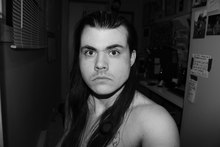B.G-Osborne (original) (raw)
From Wikipedia, the free encyclopedia
Canadian artist
| B. G-Osborne | |
|---|---|
 B.G-Osborne, home town. 35mm print, photo taken by Benjamin da Silva B.G-Osborne, home town. 35mm print, photo taken by Benjamin da Silva |
|
| Born | 1991Treaty 20 territory |
| Occupation | Artist |
| Website | https://bgosborne.weebly.com |
Oz aka B.G-Osborne/ Beck Gilmer-Osborne(born 1991)[1] is a queer, bigender, autistic, Transmedia artist, and settler of Scottish and British descent who was raised in rural Ontario, and currently lives in Newfoundland.[2] Their practice deploys photography, video, installation, print media, and performance, questions of embodiment, and using their familial archives as a way to unpack and better understand their neurodivergence, mental illnesses and connect/communicate with people.[3][4]
Early life and education
[edit]
B.G-Osborne grew up in rural Ontario, on treaty 20 territory. They graduated from NSCAD in 2014 with a BFA in Intermedia.[3] In 2018 they undertook a Masters of Information Studies in the Archival Studies program at McGill University.[1]
A Thousand Cuts is their award-winning three-channel video installation which weaves together scenes from 48 films, 34 television series, and a music video, in which cisgender actors play transgender characters. The title is a reference to the phrase "death by a thousand cuts" to allude to the video "cut" and the way popular culture media has misrepresented trans people, contributing to anti-trans violence.[5] The work was publicly censored in 2018 by Arts Common while on view in The New Gallery’s +15 Window on the basis that folks had complained about swearing and nudity.[6] The artist wrote an open letter to the offended viewers and despite attempts by The New Gallery to challenge the decision, find a compromise solution, and foster dialogue, ultimately the work was removed.[6][7][8] The controversy brought significant attention to the work which subsequently went on to be screened in numerous other galleries.[4][9][10]
Self-Portrait in Studio. March 30, 2020
In 2019 B. G-Osborne was selected by BlackFlash Magazine as the annual Optic Nerve Image Contest winner.
- ^ a b "A Thousand Cuts — Fuller Rosen Gallery". fullerrosen.com. Retrieved 2021-07-27.
- ^ "Artist talk B.G-Osborne : A Thousand Cuts / La Centrale". La Centrale Galerie Powerhouse (in Canadian French). Retrieved 2021-07-27.
- ^ a b "B.G-Osborne, Artist Talk". NSCAD. 2018-11-05. Retrieved 2021-07-27.
- ^ a b Hébert, Jessica (2020-06-05). "Interview with Beck Gilmer-Osborne Part 2 – A THOUSAND CUTS AND CENSORSHIP". Artexte. Retrieved 2021-07-28.
- ^ "B.G-Osborne's A THOUSAND CUTS: Misconceptions of Trans People in Popular Culture". Luma Quarterly. Retrieved 2021-07-27.
- ^ a b "A Thousand Cuts / The New Gallery". Archived from the original on 2021-07-27. Retrieved 2021-07-27.
- ^ "TNG eNews / Regarding Censorship and Arts Commons Partnership". us4.campaign-archive.com. Retrieved 2021-07-27.
- ^ "TNG eNews / Alternative venues screen "A Thousand Cuts", +15 Window receptions cancelled, and an invitation to an open forum". us4.campaign-archive.com. Retrieved 2021-07-27.
- ^ Sandals, Leah. "Censorship Issues Surface at Arts Commons in Calgary". Canadian Art. Retrieved 2021-08-05.
- ^ Sandals, Leah. "Artist-Run Centres Leave Calgary Arts Commons". Canadian Art. Retrieved 2021-08-05.
